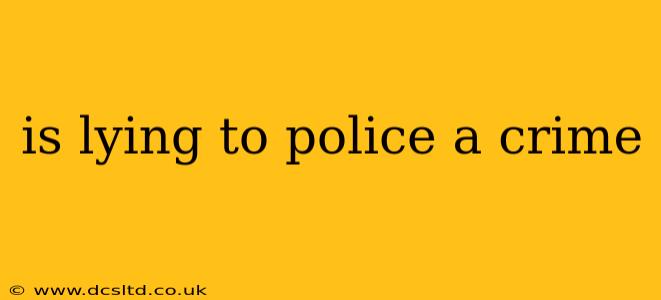Is Lying to Police a Crime? A Comprehensive Look at False Statements
Lying to the police is a complex issue, and whether it constitutes a crime depends heavily on the context. While simply telling a white lie isn't usually a criminal offense, providing false information that obstructs a police investigation or jeopardizes public safety can lead to serious legal consequences. This article explores the nuances of this issue, answering common questions surrounding false statements to law enforcement.
What kind of lies to police are illegal?
The illegality of lying to police hinges on the intent and impact of the falsehood. A casual misstatement, like incorrectly recalling a minor detail, is unlikely to be prosecuted. However, deliberately providing false information with the intent to mislead or obstruct an investigation is a different matter. This is particularly true if the lie involves:
- Serious crimes: Lying about involvement in a murder, robbery, or other serious felony will almost certainly result in charges.
- Evidence tampering: Providing false information to cover up evidence or mislead investigators about the location of evidence is a serious offense.
- Perjury: Lying under oath during a deposition, grand jury testimony, or trial is a form of perjury, a serious felony carrying significant penalties.
- Material falsehoods: False statements that are deemed "material" – meaning they significantly affect the investigation – are more likely to be prosecuted. A minor inaccuracy might be overlooked, but a fabricated alibi or false witness statement could lead to charges.
What are the penalties for lying to police?
Penalties for lying to the police vary significantly depending on jurisdiction, the severity of the lie, and the underlying crime being investigated. Possible consequences include:
- Misdemeanor charges: For less serious false statements, penalties could include fines, probation, or a short jail sentence.
- Felony charges: Lying about serious crimes or obstructing justice can lead to felony charges with substantial prison time and other penalties.
- Contempt of court: Lying under oath can result in contempt of court charges, leading to fines or imprisonment.
It's crucial to understand that even if charges aren't immediately filed, false statements can be used against you later in the investigation or trial. The police may use the inconsistency in your statements to build a stronger case against you, potentially leading to a conviction.
Is it a crime to lie to a police officer if you're not involved in a crime?
Even if you are not directly involved in a crime, lying to a police officer can still be a crime. If your lie obstructs justice or hinders the investigation of a crime, you can still face charges. For example, if you falsely identify a witness to protect them from potential harm, your actions could be viewed as hindering the investigation and therefore illegal. The key factor remains the intent and impact of the lie.
Is it a crime to lie to police about a minor offense?
Lying about a minor offense might not result in charges, but it's still a risky proposition. Police often start with minor offenses and then investigate further if inconsistencies arise. A seemingly small lie could escalate into a more serious problem if it leads to further investigation and reveals a larger issue. Honesty is always the best policy.
What if I accidentally lie to the police?
If you unintentionally provide false information, immediately correct the mistake as soon as you realize it. This demonstrates cooperation and may lessen potential consequences. However, there are no guarantees. The intent may be difficult to prove, and the impact of the initial false information will still need to be considered.
Can I refuse to answer police questions?
In many jurisdictions, you have the right to remain silent and refuse to answer police questions without a lawyer present. This is often advised, especially if you are suspected of involvement in a crime. Exercising your right to remain silent does not make you guilty, and it's important to remember that anything you say can and will be used against you in court.
Disclaimer: This information is for educational purposes only and is not a substitute for legal advice. If you are facing questioning by law enforcement or are concerned about potential charges related to false statements, consult with an attorney immediately. The laws surrounding false statements to law enforcement are complex and vary by jurisdiction.
